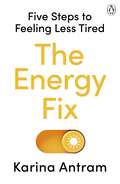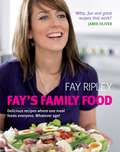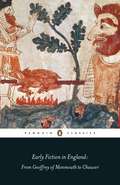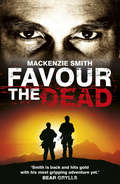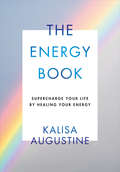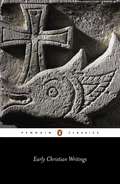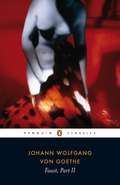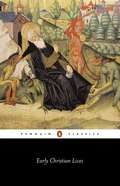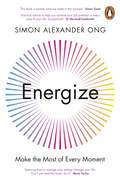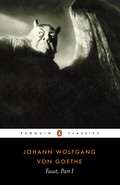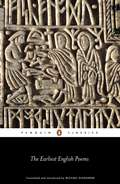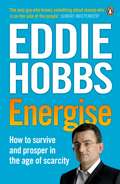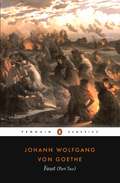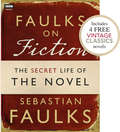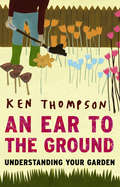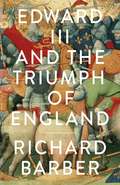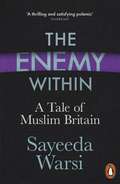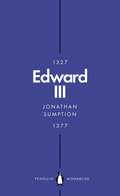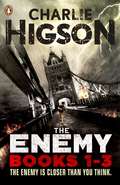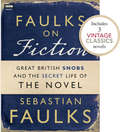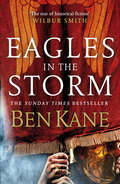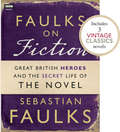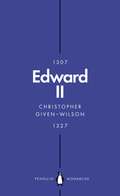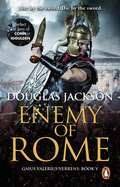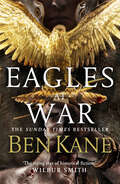- Table View
- List View
The Energy Fix: Five Steps to Feeling Less Tired
by Karina AntramFeeling tired but don't know why? This is the book anyone battling low energy needs to read.'It's a cracking book, a cracking, cracking book' Chris Evans, Virgin Radio The Energy Fix is a nutritional science book that will help you to understand why your energy levels are so low and equip you with easy, practical, everyday strategies for boosting it. Drawing on scientific research and the author’s nutritional expertise, this simple five-step approach shows how to reinvigorate and stabilise your energy levels for good: 1. Fuel your body 2. Nourish your gut 3. Supercharge your sleep and exercise 4. Power up with supplements 5. Harness the power of your mindWith The Energy Fix you can learn how to listen and respond to your body so that you never feel tired again.'This practical five-step guide to tackling tiredness combines coaching-based methodologies, useful reflections, tips and lifestyle changes' Your Healthy Living'Simple tips to boost your energy levels' The Times*Previously published as Fix Your Fatigue*
Fay's Family Food
by Fay Ripley'Witty, fun and great recipes that work!' Jamie OliverTired of cooking two or three different things every mealtime to keep your whole family happy?Fay was fed up of having to cook separately for her 1-year-old, then having to knock up something for her 5-year-old and then, with the kids in bed, finally think about cooking something to enjoy with her husband. So she started working out meals that all of them could eat together - no separate ingredients, and for all ages. This book offers suggestions and inspiration on how to feed your whole family. The idea is to cook food that you can remove your babies' and kids' portions from, before adding the more challenging ingredients for yourselves.Simple, quick, and tasty recipes include:- Honey Sweetened Breakfast Muffins - Quick Steak Stroganoff - Made-up Tuscan Sausage Stew - Saucy Sicilian Meatballs- Creamy Chicken and Ham Pie - Quick Salmon and Goats Cheese Tart - Chocolate TorteFay also includes both prep time and cooking time, to help make planning as easy as possible. This is the ultimate family cookbook, and with Fay's help you'll be cooking meals that everyone will enjoy in no time.
Early Fiction in England: From Geoffrey of Monmouth to Chaucer
by Laura AsheA brilliant new anthology that shows how fiction was reinvented in the twelfth century after an absence of hundreds of years. Essential for all students of medieval literature, Early Fiction in England includes extracts by Geoffrey of Monmouth, Wace, Marie de France, Chaucer and many others, in new translations and with illuminating introductions. Before the twelfth century, fiction had completely disappeared in Europe. In this important and provocative book, Laura Ashe shows how English writers brought it back, composing new tales about King Arthur, his knights and other heroes and heroines in Latin, French and English. Why did fiction disappear, and why did it come to life again to establish itself the dominant form of literature ever since? And what do we even mean by the term 'fiction'? Gathering extracts from the most important texts of the period by Wace, Marie de France, Chaucer and others, this volume offers an absorbing and surprising introduction to the earliest fiction in England.The anthology includes a general introduction by Laura Ashe, introductions to each extract, explanatory notes and other useful editorial materials. All French and Latin texts have been newly translated, while Middle English texts include helpful glosses.Laura Ashe is a University Lecturer in English and Fellow of Worcester College, Oxford. Her first book Fiction and History in England, 1066-1200 (Cambridge University Press, 2007) has been followed by numerous articles and edited collections; she is now writing the newOxford English Literary History vol. 1: 1000-1350 (Oxford University Press).
Favour the Dead
by Mackenzie Smith'Smith is back and hits gold with his most gripping adventure yet.' Bear GryllsMy name is Christian McKie and a few months ago I was killed in military action in Sierra Leone.I am undercover with the only people who know I am alive. We were all killed in action.And now we turn death to our advantage. We are the Regiment of the Dead.
The Energy Book: Supercharge your life by healing your energy
by Kalisa AugustineYou are your own healer. Discover how with this book.We are in 'The Age of Energy' Gwyneth Paltrow'A must read for all healers and those seeking healing.' David Grand, PhD (Developer of Brainspotting)Your energy is your essence. It's your personal power source. It influences the life choices you make. If your energy is blocked, you can feel unwell and you can get stuck in negative routines. This down-to-earth, comprehensive guide to the ancient and modern traditions of energy healing will enable you to tune in to your energy and awaken your power. Explore ancient and modern healing techniques - from reiki to sound healing, crystal healing to shamanic healing, meditation to breathwork. Use your energy to live more positively, to manifest your goals, to stay grounded, and to find greater calm and happiness.
Early Christian Writings: The Apostolic Fathers
by Andrew LouthThe writings in this volume cast a glimmer of light upon the emerging traditions and organization of the infant church, during an otherwise little-known period of its development. A selection of letters and small-scale theological treatises from a group known as the Apostolic Fathers, several of whom were probably disciples of the Apostles, they provide a first-hand account of the early Church and outline a form of early Christianity still drawing on the theology and traditions of its parent religion, Judaism. Included here are the first Epistle of Bishop Clement of Rome, an impassioned plea for harmony; The Epistle of Polycarp; The Epistle of Barnabas; The Didache; and the Seven Epistles written by Ignatius of Antioch - among them his moving appeal to the Romans that they grant him a martyr's death.
Faust, Part II: Ein Mythos Und Seine Bearbeitungen (Faust #2)
by GoetheIn this sequel to Faust, Mephistopheles takes Faust on a journey through ancient Greek mythology, conjuring for him the insurpassably beautiful Helen of Troy, as well as the classical gods. Faust falls in love with and marries Helen, embodying for Goethe his 'imaginative longing to join poetically the Romantic Medievalism of the germanic West to the classical genius of the Greeks'. Further to the themes of redemption and salvation in this great drama, are Goethe's eerie premonitions of modern phenomena such as inflation and the creation of life by scientific synthesis.
Early Christian Lives
by Athanasius Gregory Hilarion Jerome Sulpicius SeverusWritten between the mid-fourth and late sixth centuries to commemorate and glorify the achievements of early Christian saints, these six biographies depict men who devoted themselves to solitude, poverty and prayer. Athanasius records Antony's extreme seclusion in the Egyptian desert, despite temptation by the devil and visits from his followers. Jerome also shows those who fled persecution or withdrew from society to pursue lives of chastity and asceticism in his accounts of Paul of Thebes, Hilarion and Malchus. In his Life of Martin, Sulpicius Severus describes the achievements of a man who combined the roles of monk, bishop and missionary, while Gregory the Great tells of Benedict, whose Rule became the template for monastic life. Full of vivid incidents and astonishing miracles, these Lives have provided inspiration as models for centuries of Christian worship.
Energize: Make the Most of Every Moment
by Simon Alexander OngWinner of the 2023 Business Book Award for Wellness and Wellbeing 'This book is exactly what we need in this moment. With so many pulls and strains and stresses, Simon offers us simple steps for every one of us to indeed energize!' Simon Sinek, optimist and New York Times bestselling author of Start With Why'Learning how to manage your energy changes your life. Don't just read this book, do it!' Marie Forleo, author of the #1 New York Times bestseller Everything is FigureoutableYour energy is everything: it is the fuel that drives your success and it gives you the power to achieve your potential. So how can you be your best self if you're always tired, stressed and burnt out? In Energize, award-winning life coach Simon Alexander Ong introduces you to the art and science of energy management. In a world where we are always on, Ong coaches you to work with your natural energy resources to recognize your most energized state - when to push and when to recoup - so that you can work sustainably towards your biggest goals. You'll learn how to:- Speak less and listen more- Stop treating your health as a side hustle- Silence your inner critic and listen to your inner guide instead - Progress faster by saying no to the activities that are holding you backYou'll hear from Ong's clients who have used his transformational method to achieve what they never thought they could. You'll learn how to use his practical framework to identify your most productive phases of the day, week and year, and learn how to make the most of them. You'll discover how to create boundaries and devote your energy in the right way and to the right people. And you'll master simple practices that you can build into your day to revitalize and preserve your energy levels so that you're ready for anything.It's time to find out what you can achieve when you feel energized.'Thoughtfully written and incredibly researched, Energize will change the way you view energy in and around you. Simon provides practical advice to help you achieve your full potential in every area of your life. Exceptional!' Dr Marshall Goldsmith, Thinkers50 #1 Executive Coach and author of New York Times bestselling author of Triggers'Learning how to energize ourselves is key to being happy and successful' Shaa Wasmund MBE, author of How to Fix Your Sh*t
Faust, Part I: Ein Mythos Und Seine Bearbeitungen (Faust #1)
by GoetheGoethe's Faust reworks the late-medieval myth of Dr Faust, a brilliant scholar so disillusioned he resolves to make a contract or wager with the devil, Mephistopheles. The devil will do all he asks on Earth and seek to grant him a moment in life so glorious that he will wish it to last for ever. But if Faust does bid the moment stay, he falls to Mephisto and must serve him after death. In this first part of Goethe's great work the embittered thinker and Mephistopheles enter into their agreement, and soon Faust is living a life beyond his study and - in rejuvenated form - winning the love of the charming and beautiful Gretchen. But in this compelling tragedy of arrogance, unfulfilled desire and self-delusion, Faust, served by the devil, heads inexorably towards destruction.
The Earliest English Poems
by Michael AlexanderAnglo-Saxon poetry was produced between 700 and 1000 AD for an audience that delighted in technical accomplishment, and the durable works of Old English verse spring from the source of the English language. Michael Alexander has translated the best of the Old English poetry into modern English and into a verse form that retains the qualities of Anglo-Saxon metre and alliteration. Included in this selection are the ‘heroic poems’ such as Widsith, Deor, Brunanburh and Maldon, and passages from Beowulf; some of the famous ‘riddles’ from The Exeter Book; all the ‘elegies’, including The Ruin, The Wanderer, The Seafarer, The Wife’s Complaint and The Husband’s Message, in which the virtu of Old English is found in its purest and most concentrated form; together with the great Christian poem The Dream of the Rood.
Energise: How to survive and prosper in the age of scarcity
by Eddie HobbsEddie Hobbs has never been one to shy away from a challenge and his advice is that you shouldn't either! When the oil that we depend reaches scary prices, our lives are going to change utterly. This is going to happen much sooner than most of us want to admit and if we do not prepare for it, it's going to hit us where it hurts most: in our pockets.For years, Eddie Hobbs has been encouraging and supporting Irish people in getting to grips with our finances and now, in Energise, he gives us the tools to get to grips with the coming energy crisis and age of high inflation.In Energise he explains what you can do to prepare. You'll learn a range of strategies for managing your money so that wherever you are on the financial ladder - whether just waking up to the reality that you must take control of your finances, or wondering how your savings, pensions and investments are going to fare when the price of oil sky-rockets - you can survive and prosper during this age of high inflation. You'll also learn what Ireland needs to do to get ready for the energy crisis and what you can do to help raise public and political awareness.Eddie shows how, by taking control of your response to the new world order, you can prosper in unforeseen new ways. Energise is the essential starting point for getting to grips with the imminent age of scarcity.
Faust: Ein Mythos Und Seine Bearbeitungen (Thrift Editions Ser.)
by Johann Wolfgang GoetheThe second part of Goethe's masterpiece opens with Faust struggling to recover from the death of his beloved Gretchen. The quick-witted demon Mephistopheles soon persuades him to look beyond his sorrow and enter the world of politics and power, but the great scholar is still eager for new sensations, and asks Mephistopheles to reveal Helen of Troy to him in a vision. Overwhelmed by her beauty, Faust demands she be brought back from the underworld - but even this fails to bring him contentment, and his appetite for knowledge remains unsated. Completed a few months before Goethe's death, this rich and allusive work weaves together a wealth of diverse philosophical ideas and influences, reworking the medieval myth of Dr Faustus and speculating upon the search for truth in the Age of Enlightenment.
Faulks on Fiction (Includes 4 FREE Vintage Classics): Great British Characters and the Secret Life of the Novel
by Sebastian FaulksThe publication of Robinson Crusoe in London in 1719 marked the arrival of a revolutionary art form: the novel. British writers were prominent in shaping the new type of storytelling - one which reflected the experiences of ordinary people, with characters in whom readers could find not only an escape, but a deeper understanding of their own lives. But the novel was more than just a reflection of British life. As Sebastian Faulks explains in this engaging literary and social history, it also helped invent the British. By focusing not on writers but on the people they gave us, Faulks not only celebrates the recently neglected act of novelistic creation but shows how the most enduring fictional characters over the centuries have helped map the British psyche - through heroes from Tom Jones to Sherlock Holmes, lovers from Mr Darcy to Lady Chatterley, villains from Fagin to Barbara Covett and snobs from Emma Woodhouse to James Bond. Also included in this fantastic ebook package are four free classic novels:Robinson Crusoe by Daniel Defoe: The legendary story of a marine adventurer shipwrecked on a desert island.Pride and Prejudice by Jane Austen: Accomplished Elizabeth Bennett must navigate a web of familial obligations and social expectations in this witty drama of friendship, rivalry, enmity and love. Great Expectations by Charles Dickens: Pip's life as an ordinary country boy is destined to be unexceptional until a chain of mysterious events lead him away from his humble origins and up the social ladder.The Woman in White by Wilkie Collins: Marian and her sister Laura live a quiet life under their uncle's guardianship until Laura marries Sir Percival Glyde, a man of many secrets. Can she be protected from a mysterious and potentially fatal plot?
An Ear to the Ground: Understanding Your Garden
by Ken ThompsonHow did plants get to be the way they are? Why do they have pretty flowers? How different would things have been if the wrong kind of pollinators had got the upper hand? Why are Latin names so complicated, and why Latin anyway? Why is a weed-free lawn an ecological impossibility?This entertaining book gives the answers to these questions and many more. It shows how a little botanical knowledge can bring not just better results but peace of mind, and that losing sleep over such traditional gardening bogeys as weeds, pests and pruning is not necessarily the best course. In this new edition Ken Thompson grabs the opportunity to explain why any old plant will do for companion planting - but also that it can do as much harm as good - and why planting by the moon is complete and utter nonsense.
Edward III and the Triumph of England: The Battle of Crécy and the Company of the Garter
by Richard BarberA fascinating recreation of the world of one of England's most charismatic monarchs, from award-winning author and historian Richard BarberThe destruction of the French army at Crécy in 1346 and the subsequent siege and capture of Calais marked a new era in European history. The most powerful, glamorous and respected of all western monarchies had been completely humiliated by England, a country long viewed either as a chaotic backwater or a mere French satellite.The young Edward III's triumph would launch both countries, as we now know, into a grim cycle of some 90 years of further fighting ending with English defeat, but after Crécy anything seemed possible - Edward's claim to be King of France could be pressed home and, in any event, enormous rewards of land, treasure and prestige were available both to the king and to the close companions who had made the victory possible. It was to enshrine this moment that Edward created one of the most famous of all knightly orders, the Company of the Garter.Barber writes about both the great campaigns and the individuals who formed the original membership of the Company - and through their biographies makes the period tangible and fascinating. This is a book about knighthood, battle tactics and grand strategy, but it is also about fashion, literature and the privates lives of everyone from queens to freebooters. Barber's book is a remarkable achievement - but also an extremely enjoyable one.Reviews:'Barber [has an] infectious passion for and deep knowledge of his subject matter ... elegant prose and rigorous historical analysis ... a valuable and thorough addition to the body of work on this most impressive of English monarchs' Sunday Times'In Edward III and the Triumph of England [Barber] has written the kind of book that the king would have enjoyed: full of battles, glitter and ceremony ... he has an original eye and an elegant pen' Jonathan Sumption, Literary Review'Barber share's his hero's love of chivalry ... The book sparkle[s] with some of Edward's own glitz' Telegraph'This absorbing book is layered rather than linear, sifting with uncommon sensitivity through challenging sources to test the boundaries of what we can and cannot know ... We discover the complexity of the world in which Edward and his commanders lived' Helen Castor, The TimesAbout the author:Richard Barber has had a huge influence on the study of medieval history and literature, both as a writer and as a publisher. His major works include The Knight and Chivalry (winner of the Somerset Maugham Award), Edward Prince of Wales and Aquitaine, The Penguin Guide to Medieval Europe and The Holy Grail: The History of a Legend. He lives in East Anglia.
The Enemy Within: A Tale of Muslim Britain
by Sayeeda Warsi'Hard headed, well informed and intellectually coherent ... it turns conventional wisdom on its head. It deserves to promote a public debate on this subject which has been needed for more than 20 years' Peter OborneBritain has often found groups within its borders whom it does not trust, whom it feels have a belief, culture, practice or agenda which runs contrary to those of the majority. From Catholics to Jews, miners to trade unionists , Marxists to liberals and even homosexuals, all have at times been viewed, described and treated as 'the enemy within'. Muslims are the latest in a long line of 'others' to be given this label. How did this state of affairs come to pass? What are the lessons and challenges for the future - and how will the tale of Muslim Britain develop? Sayeeda Warsi draws on her own unique position in British life, as the child of Pakistani immigrants, an outsider, who became an insider, the UK's first Muslim Cabinet minister, to explore questions of cultural difference, terrorism, surveillance, social justice, religious freedom, integration and the meaning of 'British values'.Uncompromising and outspoken, filled with arguments, real-life experience, necessary truths and possible ways forward for Muslims, politicians and the rest of us, this is a timely and urgent book.'This thoughtful and passionate book offers hope amid the gloom' David Anderson QC, Independent Reviewer of Terrorism Legislation'A vital book at a critical time' Helena Kennedy QC
Edward III: A Heroic Failure (Penguin Monarchs)
by Jonathan SumptionEdward III lived through bloody and turbulent times. His father was deposed by his mother and her lover when he was still a teenager; a third of England's population was killed by the Black Death midway through his reign; and the intractable Hundred Years War with France began under his leadership. Yet Edward managed to rule England for fifty years, and was viewed as a paragon of kingship in the eyes of both his contemporaries and later generations. Venerated as the victor of Sluys and Crécy and the founder of the Order of the Garter, he was regarded with awe even by his enemies. But he lived too long, and was ultimately condemned to see thirty years of conquests reversed in less than five. In this gripping new account of Edward III's rise and fall, Jonathan Sumption introduces us to a fêted king who ended his life a heroic failure.
The Enemy Series, Books 1-3 (The Enemy)
by Charlie HigsonThey'll chase you. They'll rip you open. They'll feed on you . . .The Enemy (Book 1)When the sickness came, every parent, police officer, politician - every adult - fell ill. The lucky ones died. The others are crazed, confused and hungry.Only children under fourteen remain, and they're fighting to survive.A gang of children begin their quest across London, where all through the city - down alleyways, in deserted houses, underground - the grown-ups lie in wait. The Dead (Book 2)Jack and Ed are best friends, but their battle to stay alive tests their friendship to the limit as they go on the run with a mismatched group of other kids. And one adult. Greg, a butcher, who claims he's immune to the disease. As a fresh disaster threatens to overwhelm London, they realize they won't all survive...The Fear (Book 3)DogNut and the rest of his crew want to find their lost friends, and set off on a deadly mission from the Tower of London to Buckingham Palace and beyond, as the sickos lie in wait. But who are their friends and who is the enemy in this changed world?
Faulks on Fiction (Includes 3 Vintage Classics): Great British Snobs and the Secret Life of the Novel
by Sebastian FaulksThe publication of Robinson Crusoe in London in 1719 marked the arrival of a revolutionary art form: the novel. British writers were prominent in shaping the new type of storytelling - one which reflected the experiences of ordinary people, with characters in whom readers could find not only an escape, but a deeper understanding of their own lives. But the novel was more than just a reflection of British life. As Sebastian Faulks explains in this engaging literary and social history, it also helped invent the British. By focusing not on writers but on the people they gave us, Faulks not only celebrates the recently neglected act of novelistic creation but shows how the most enduring fictional characters over the centuries have helped map the British psyche. In this ebook, Sebastian celebrates the greatest snobs in fiction - from Emma Woodhouse to James Bond.Also included are three classic novels: Emma by Jane Austen: Emma is rich, independent and preoccupied with arranging suitors for her acquaintances. Her plans for the matrimonial success of a new friend, however, lead her into complications that ultimately test her own detachment from the world of romance.Great Expectations by Charles Dickens: Pip's life as an ordinary country boy is destined to be unexceptional until a chain of mysterious events lead him away from his humble origins and up the social ladder. The Diary of a Nobody by George and Weedon Grossmith: Mr Charles Pooter is a respectable man, unfortunately, nobody seems to recognise his gentility. George and Weedon Grossmith's comic novel, perfectly illustrated, is a glorious, affectionate caricature of the English middle-class at the end of nineteenth century.
Eagles in the Storm (Eagles of Rome #3)
by Ben KaneAD 15. The German chieftain Arminius has been defeated, one of the lost Roman eagles recovered, and thousands of German tribesmen slain. Yet these successes aren’t nearly enough for senior centurion Lucius Tullus. Not until Arminius is dead, his old legion’s eagle found and the enemy tribes completely vanquished will he rest. But Arminius – devious, fearless – is burning for revenge of his own. Charismatic as ever, he raises another large tribal army, which will harry the Romans the length and breadth of the land. Soon Tullus finds himself in a cauldron of bloodshed, treachery and danger. His mission to retrieve his legion’s eagle will be his most perilous yet…
Faulks on Fiction (Includes 3 Vintage Classics): Great British Heroes and the Secret Life of the Novel
by Sebastian FaulksThe publication of Robinson Crusoe in London in 1719 marked the arrival of a revolutionary art form: the novel. British writers were prominent in shaping the new type of storytelling - one which reflected the experiences of ordinary people, with characters in whom readers could find not only an escape, but a deeper understanding of their own lives. But the novel was more than just a reflection of British life. As Sebastian Faulks explains in this engaging literary and social history, it also helped invent the British. By focusing not on writers but on the people they gave us, Faulks not only celebrates the recently neglected act of novelistic creation baplaudsut shows how the most enduring fictional characters over the centuries have helped map the British psyche. In this ebook, Sebastian celebrates the greatest heroes in fiction - from Tom Jones to Sherlock Holmes. Also included are three classic novels:Robinson Crusoe by Daniel Defoe: The legendary story of a shipwreck on a desert island.Vanity Fair by William Makepeace Thackeray: The story of a young woman's spectacular rise and fall as she gambles, manipulates and seduces her way through high society and the Napoleonic wars.The Hound of the Baskervilles by Arthur Conan Doyle: Sherlock Holmes' most famous case as he uncovers the truth behind the terrifying legend of a supernatural hound which preys upon the cursed Baskerville family.
Edward II: The Terrors of Kingship (Penguin Monarchs)
by Christopher Given-Wilson'He seems to have laboured under an almost child-like misapprehension about the size of his world. Had greatness not been thrust upon him, he might have lived a life of great harmlessness.'The reign of Edward II was a succession of disasters. Unkingly, inept in war, and in thrall to favourites, he preferred digging ditches and rowing boats to the tedium of government. His infatuation with a young Gascon nobleman, Piers Gaveston, alienated even the most natural supporters of the crown. Hoping to lay the ghost of his soldierly father, Edward I, he invaded Scotland and suffered catastrophic defeat at the Battle of Bannockburn. After twenty ruinous years, betrayed and abandoned by most of his nobles and by his wife and her lover, Edward was imprisoned in Berkeley Castle and murdered - the first English king since the Norman Conquest to be deposed.
Enemy of Rome: (Gaius Valerius Verrens 5): Bravery and brutality at the heart of a Roman Empire in the throes of a bloody civil war (Gaius Valerius Verrens #5)
by Douglas JacksonA gripping, adrenalin-fuelled historical page-turner from bestselling author Douglas Jackson. Perfect for fans of Simon Scarrow and Ben Kane.Readers are loving Gaius Valerius Verrens! "Once you have started you will want to read every volume in this exciting series [set] during one of the most turbulent times in Roman history" - 5 STARS "Douglas Jackson undoubtedly holds the crown as king of his genre" - 5 STARS"It is another tough book to put down" - 5 STARS"An entertaining and compelling read that makes you feel as if you were there!" - 5 STARS*****************************************LIVE BY THE SWORD. DIE BY THE SWORD.Summer, AD 69: Rome and its empire are in turmoil. The emperor Otho is dead by his own hand and his rival, Aulus Vitellius, occupies the imperial throne. However, a new challenge has arisen in the East - the legions of Titus Flavius Vespasian have declared him their Emperor.In the dry heat of an August morning, Gaius Valerius Verrens prepares for his last day on Earth. Wrongly accused of deserting his legion on the field of Bedriacum, it seems he is destined to die a coward's death. Then the executioner's hand is stayed. Vitellius' enemies will spare his life if he pledges allegiance to Vespasian. Valerius - tired of the endless slaughter - agrees. And so he must battle his way south to Rome in order to persuade his friend Vitellius to stand down for the greater good. But this is civil war and this is Rome, and Valerius - his loyalties divided and branded an enemy of the people - is trapped in a maze of distrust, corruption, betrayal and blood-letting . . .Gaius Valerius Verrens's adventures continue in Scourge of Rome.
Eagles at War (Eagles of Rome #1)
by Ben KaneONLY THE GODS CAN SAVE THE ROMANS NOW AD 9, Germania. East of the river Rhine, tribes hostile to Rome prepare a deadly ambush. Their leader is the charismatic chieftain and trusted ally of Rome, Arminius, whose dream is to drive out the brutal invaders of his land. Pitted against him are veteran centurion Lucius Tullus and the Roman provincial governor, Varus.Together with three local legions, they leave their summer camp to begin the march back to the Roman forts on the Rhine.They have no idea that in the forests and bog of the Teutoburg, mud, slaughter and bloody death await …‘This is historical fiction at its best' Sunday Express'Held me spellbound to its spectacular bloody end' Manda Scott'Gripping, brutal, brilliant' Giles Kristian
